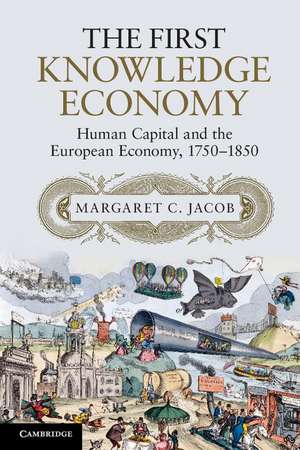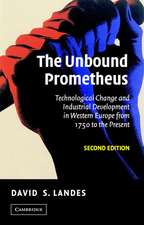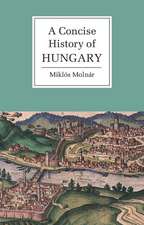The First Knowledge Economy: Human Capital and the European Economy, 1750–1850
Autor Margaret C. Jacoben Limba Engleză Paperback – 8 ian 2014
| Toate formatele și edițiile | Preț | Express |
|---|---|---|
| Paperback (1) | 275.01 lei 6-8 săpt. | |
| Cambridge University Press – 8 ian 2014 | 275.01 lei 6-8 săpt. | |
| Hardback (1) | 552.28 lei 6-8 săpt. | |
| Cambridge University Press – 8 ian 2014 | 552.28 lei 6-8 săpt. |
Preț: 275.01 lei
Nou
Puncte Express: 413
Preț estimativ în valută:
52.66€ • 54.83$ • 43.69£
52.66€ • 54.83$ • 43.69£
Carte tipărită la comandă
Livrare economică 14-28 februarie
Preluare comenzi: 021 569.72.76
Specificații
ISBN-13: 9781107619838
ISBN-10: 1107619831
Pagini: 265
Ilustrații: 11 b/w illus. 2 maps
Dimensiuni: 153 x 227 x 12 mm
Greutate: 0.41 kg
Ediția:New.
Editura: Cambridge University Press
Colecția Cambridge University Press
Locul publicării:New York, United States
ISBN-10: 1107619831
Pagini: 265
Ilustrații: 11 b/w illus. 2 maps
Dimensiuni: 153 x 227 x 12 mm
Greutate: 0.41 kg
Ediția:New.
Editura: Cambridge University Press
Colecția Cambridge University Press
Locul publicării:New York, United States
Cuprins
Introduction: knowledge and industrial development: the stakes; 1. A portrait of early industrial lives: the Watts and Boultons, science and entrepreneurship; 2. The knowledge economy and coal: how technological change happened; 3. Technical knowledge and making cotton king; 4. Textiles in Leeds: mechanical science on the factory floor; 5. The puzzle of French retardation: reform and its antecedents; 6. The puzzle of French retardation: restoration and reaction; 7. Education and the inculcation of industrial knowledge: the Low Countries, 1750–1830.
Recenzii
'… there is every reason to recommend this book and over its Jacob predecessors and indeed to delight in the research it contains. This is undoubtedly part of the story of industrialization.' Pat Hudson, The Journal of Modern History
'A significant strength is the elimination of economic determinism and the inclusion of knowledge of science into the public equation. Jacob's coherent argument, premised on solid evidence … unequivocally shows that the first knowledge economy in the world emerged in parallel with the Industrial Revolution.' Fedir V. Razumenko, Canadian Journal of History
'This is a compact and tightly argued book, at its best when refuting Robert Allen's claim that coal and high wages gave Great Britain its edge (see Robert Allen, Industrial Revolution in Global Perspective [Cambridge, 2009]). It is also a provocative read, liable to raise more questions than it answers.' Lissa Roberts, Isis
'A significant strength is the elimination of economic determinism and the inclusion of knowledge of science into the public equation. Jacob's coherent argument, premised on solid evidence … unequivocally shows that the first knowledge economy in the world emerged in parallel with the Industrial Revolution.' Fedir V. Razumenko, Canadian Journal of History
'This is a compact and tightly argued book, at its best when refuting Robert Allen's claim that coal and high wages gave Great Britain its edge (see Robert Allen, Industrial Revolution in Global Perspective [Cambridge, 2009]). It is also a provocative read, liable to raise more questions than it answers.' Lissa Roberts, Isis
Notă biografică
Descriere
Provocative new account of the importance of knowledge to the economic transformation of western Europe during the Industrial Revolution.











